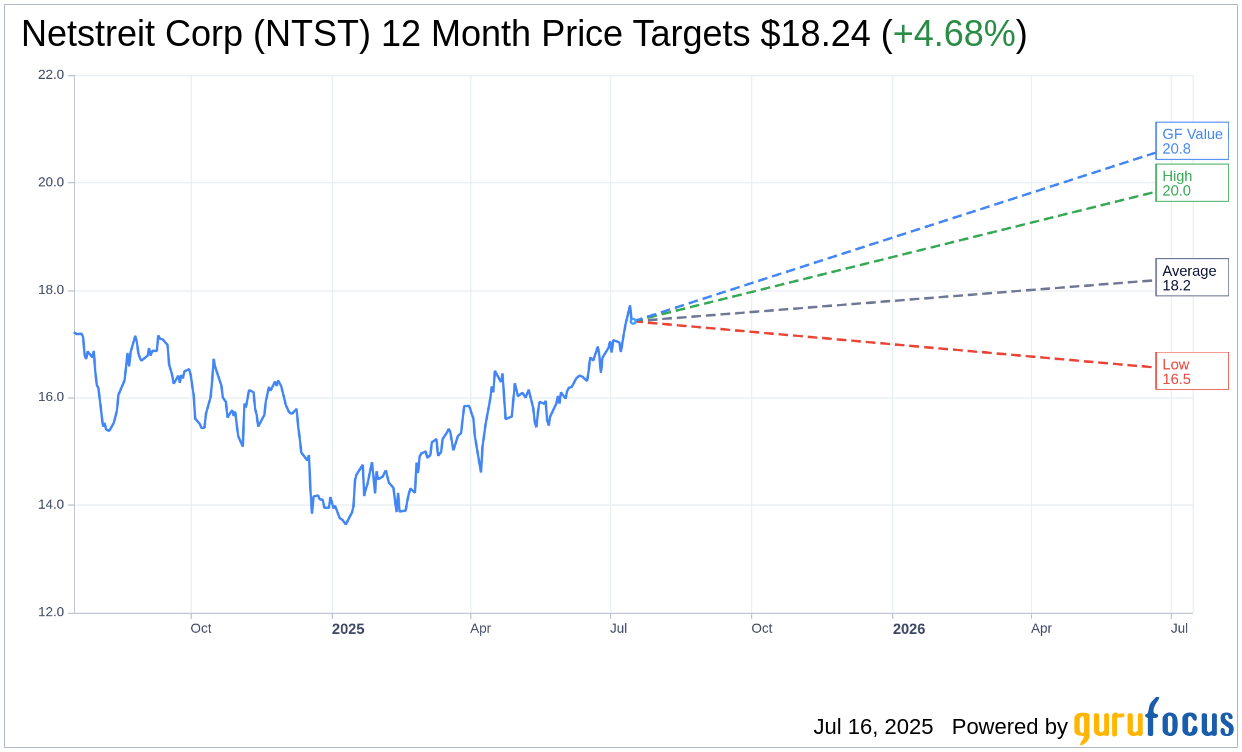UBS has increased its price target for Netstreit (NTST, Financial), moving it up from $18 to $20. This adjustment comes with the continuation of a Buy rating on the company's shares. The move reflects UBS's positive outlook on NTST, signaling confidence in its future performance.
Wall Street Analysts Forecast

Based on the one-year price targets offered by 17 analysts, the average target price for Netstreit Corp (NTST, Financial) is $18.24 with a high estimate of $20.00 and a low estimate of $16.50. The average target implies an upside of 4.68% from the current price of $17.42. More detailed estimate data can be found on the Netstreit Corp (NTST) Forecast page.
Based on the consensus recommendation from 18 brokerage firms, Netstreit Corp's (NTST, Financial) average brokerage recommendation is currently 2.0, indicating "Outperform" status. The rating scale ranges from 1 to 5, where 1 signifies Strong Buy, and 5 denotes Sell.
Based on GuruFocus estimates, the estimated GF Value for Netstreit Corp (NTST, Financial) in one year is $20.78, suggesting a upside of 19.29% from the current price of $17.42. GF Value is GuruFocus' estimate of the fair value that the stock should be traded at. It is calculated based on the historical multiples the stock has traded at previously, as well as past business growth and the future estimates of the business' performance. More detailed data can be found on the Netstreit Corp (NTST) Summary page.
NTST Key Business Developments
Release Date: April 29, 2025
- Net Income: $1.7 million or $0.02 per diluted share.
- Core FFO: $24.6 million or $0.30 per diluted share.
- AFFO: $26.2 million or $0.32 per diluted share, a 3.2% increase over last year.
- Gross Investments: $90.7 million at a blended cash yield of 7.7%.
- Disposition Proceeds: $40.3 million across 16 properties at a 7.3% blended cash yield.
- Properties: Investments in 695 properties leased to 101 tenants across 45 states.
- Investment Grade Tenants: 71% of total ABR leased to investment grade or investment grade profile tenants.
- Weighted Average Lease Term: 9.7 years.
- G&A Expenses: Total recurring G&A increased 5% year-over-year to $5.1 million.
- Debt Financing: Closed on $275 million of additional financing commitments, including a $175 million senior unsecured term loan.
- Weighted Average Interest Rate: 4.57%.
- Total Liquidity: $584 million at quarter end.
- Leverage: Adjusted net debt to annualized adjusted EBITDAre was 4.7 times.
- AFFO Guidance: Increased to a range of $1.28 to $1.30 per share.
- Dividend: Quarterly cash dividend of $0.21 per share, with an AFFO payout ratio of 66% for the first quarter.
For the complete transcript of the earnings call, please refer to the full earnings call transcript.
Positive Points
- Netstreit Corp (NTST, Financial) completed $90.7 million of gross investments at a blended cash yield of 7.7%, with a weighted average lease term of 9.2 years.
- The company has successfully reduced its top five tenant concentration by 70 basis points to 28.2% of ABR, including a 50 basis point reduction in its top tenant, Dollar General.
- 71% of Netstreit Corp (NTST)'s total ABR is leased to investment grade or investment grade profile tenants, indicating strong credit quality.
- The company reported zero credit losses during COVID and has maintained best-in-class performance since going public.
- Netstreit Corp (NTST) increased the low end of its AFFO per share guidance, reflecting confidence in its financial performance and stability.
Negative Points
- The investment pace remains more measured compared to prior years due to a focus on maintaining a low leverage balance sheet.
- Recurring G&A expenses increased by 5% year-over-year, primarily due to increased staffing and further investment in the team.
- The company is facing challenges in the transaction market, with no significant change since April 2, indicating potential stagnation.
- Netstreit Corp (NTST) has a 75 basis points assumption for unknown rent loss in its guidance, reflecting macroeconomic uncertainties.
- The company is cautious about its cost of capital, which is currently limiting its ability to accelerate investment activities.